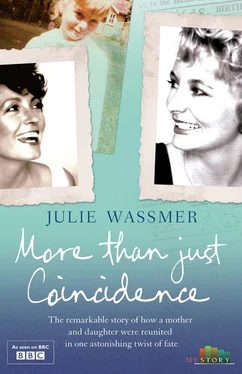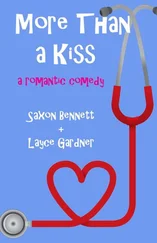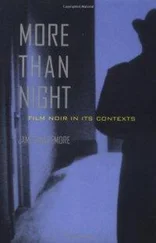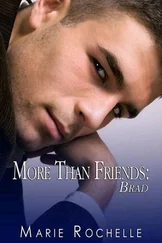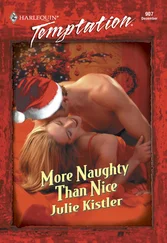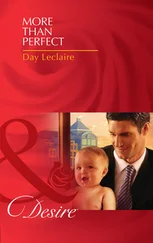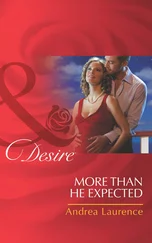My mum, Margaret Mary Exley, always known as Margie, had had a tough childhood in London’s East End. One of five children whose father, a docker, had died of TB as a young man, she had left school at fourteen to help support her family. To her, work was not only a question of economic necessity but the key to self-reliance. She had given birth to me at the age of thirty-three—unusually late, in the 1950s, for a woman to be having her first child—and a schoolfriend once commented to me how different she seemed from the other mums, most of whom had jobs in factories but dreamed of having enough money coming in to be able to stay at home with their children. My mum, on the other hand, had to be persuaded by my father to give up full-time employment to take care of me. She did so until I was four, but she couldn’t wait to get back to work once I started infant school.
It was not as if she were a high-flying businesswoman with a fulfilling career. She worked as a waitress, on her feet all day, in a busy Kardomah coffee house on Kingsway in Holborn. But having known severe poverty growing up, she was in constant fear of sinking back into the kind of hand-to-mouth existence governed by pawnshops and tallymen. She seemed to live in a state of heightened reality, nerves strung taut, like a meerkat perpetually alert to danger. Yet at the same time she had a keen and tireless curiosity about other people, places and lifestyles that she could only glimpse in Hollywood films, and the coffee house, like the cinema, offered an escape from the daily grind of the East End. Every evening, she would come back with stale but exotic confections: sandwiches in rye bread, fruit croissants and Danish pastries—delicacies never found at that time among the custard tarts and pork pies of an East End bakery.
Many of her customers worked nearby at Bush House, the headquarters of the BBC World Service, and she would proudly bring home autographed photographs of 1960s ‘celebrities’ like the debonair newsreader Reggie Bosanquet, the actor Sam Kydd and even, rather surprisingly, strip-club owner Paul Raymond, the so-called ‘King of Soho’.
Years later, one night in 1978, the television news was headlined by the mysterious death of the Bulgarian dissident novelist and playwright Georgi Markov, believed to have been murdered with the tip of a poisoned umbrella. My mother was distraught. Markov, who had worked for the BBC World Service since being granted political asylum in 1969, had been not only her customer but also her friend, chatting with her every day over coffee and always leaving a good tip. She knew him as ‘my Georgie’. It’s a wonder MI5 didn’t take her in for background questioning.
My mother had been working at the Royal Mint at Tower Hill, swinging heavy bags of metal on to trucks, when she met my father, Bill Wassmer, a coiner who struck metal into money. Born in 1917, my dad was the eldest son of a soldier who had settled on Civvy Street as a baker. A dyed-in-the-wool trade union man, he was intelligent but for the most part self-educated. He became the long-term shop steward at the Mint, arguing his causes with considerable adversarial skill.
When they married in 1950 my parents put their names on the council housing list and moved into two upstairs rooms sublet to them by my father’s uncle and aunt while they waited for a home of their own. In my mind’s eye I can picture my father carrying their few possessions into their temporary accommodation at Lefevre Road whistling ‘If I Knew You Were Comin’ I’d’ve Baked a Cake’, the cheery song popularised that year by Eileen Barton and Gracie Fields. Nearly twenty years later Jimi Hendrix and Led Zeppelin supplied a grittier soundtrack to the times—and my parents were still waiting to be rehoused.
They had already been at 25 Lefevre Road for three years when I came along on 5 January 1953, and there we would remain until 1969. The house was a Victorian terrace with a bay window flanked by tall pillars. In the 1950s and 1960s it was impossible to imagine that such decrepit slums would be sought after and gentrified by Thatcher’s generation. They had leaking roofs and so much subsidence that the upper ceilings sagged alarmingly. Landlords never did repairs so, whenever there was heavy rain or snow, buckets had to be positioned at strategic points around the floors. We had a living room with a tiny kitchenette leading off it through an open doorway, one bedroom, an outside toilet and a rusting tin bath which hung on the garden wall—but no hot water. From time to time, mice scratched and scuttled in the wainscot. Occasionally they’d be sucked up by the Hoover, not a pleasant experience for us or for them. As I never had a bedroom of my own—I slept in the same room as my parents when I was small and graduated to the living-room sofa when I was older—I had no territory that was exclusively mine, no private place or space to keep my personal things, but as I knew nothing else I didn’t feel deprived until I came to see how other people lived.
My parents were not so much a couple as two soulmates with their own individual interests—in my mother’s case the pictures and her beloved Kardomah coffee house, and darts and the Hackney Wick dog track in my dad’s. They were opposites, owl and fowl—she was a night person; he rose early. He was easygoing while she did most of the worrying. Television adverts warning of body odour or bad breath provoked paranoia in my mum since she had been born without a sense of smell. As a result she moved around in a cloud of cheap perfume, forever checking gas taps to make sure they weren’t left on.
Although her education had been brief, my mother was bright and intuitive. An instinctive judge of character and situations, she seemed to understand what made people tick. She would instantly pick up on the importance of what remained unsaid in a conversation and at the Rex she always grasped the subtext of a film. My father often remarked that she was psychic. She certainly appeared to be able to read his mind and invariably knew exactly what he was about to say. Around him, she was never timid. Sensitive to the scars of her childhood privations, Dad had long ago assumed the role of her protector. Mum had been schooled by Irish nuns, and the Catholic guilt they instilled in her had been reinforced at home. After her father’s early death, one of her elder brothers had taken on the role of the head of the family and when she was fourteen he had given her a good beating after catching her talking to a boy in the street. She never forgot the lesson acquired so painfully: we may be poor, but heaven help you if you bring shame on this family. Thereafter even bare arms were taboo. I can’t recall her ever once wearing short sleeves, even during the occasional week we might spend at the Pontin’s holiday camp in Pakefield, near Lowestoft.
My father, on the other hand, was a staunch Protestant and had no time for Catholicism. He was fond of making speeches about the need for clear, rational thought, unclouded by religious doctrine. It was impossible, he would say, for anyone to get a proper education at the hands of priests or nuns because they failed to teach children to think for themselves. He was a big fan of Oliver Cromwell, who stood against Charles I’s assertion of the divine right of kings, and Martin Luther, who dared to rebel against the Pope.
At the age of four, safe from the clutches of priests and nuns, I started at the local infant school in Roman Road, opposite Kelly’s eel and pie shop. I ate pie and mash, covered in the thick green parsley sauce known to East Enders as ‘liquor’, almost every lunchtime. Outside the shop, on the stall, slate-grey eels writhed in metal trays before being grabbed, chopped and stuffed into bags, the individual chunks still squirming as housewives carried them home to boil or steam.
Читать дальше
